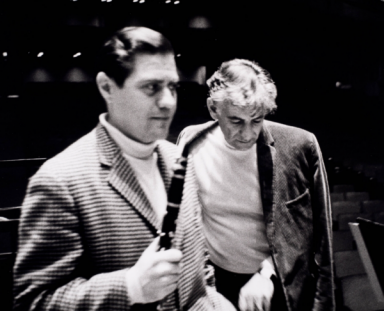Latest News
From the Archives: Bernstein and the Clarinet - Stanley Remembers Lenny
Posted January 26, 2023
This article pre-dates Stanley Druckers death in 2022.
Bernstein and the Clarinet: Stanley Remembers Lenny
by Amy Shapiro
(as printed in the Spring/Summer 2006 issue of Prelude, Fugue & Riffs)

Photo: Stanley Drucker & Leonard Bernstein, ca. 1960. Courtesy of the New York Philharmonic Archives.
Stanley Drucker, now in the midst of his 58th season with the New York Philharmonic, had a strong connection with Leonard Bernstein. While still a teenager studying at The Curtis Institute of Music, Drucker gave the Philadelphia premiere of Bernstein's Sonata for Clarinet (1942) with pianist Shirley Gabis on February 23, 1945.
After joining the Philharmonic in 1948, Drucker was appointed principal clarinet by Bernstein in 1960. Drucker, who recorded Bernstein's Sonata in 1970 and again in 1996, also gave the New York Philharmonic premiere of Bernstein's Prelude, Fugue and Riffs for Solo Clarinet and Jazz Ensemble (1949/1955) in 1988.
The fallowing interview, which was originally part of an undergraduate honors project at Hofstra University, can be read in its entirety in the December 2005 and March 2006 issues of The Clarinet, the journal of the International Clarinet Association.
Amy Shapiro (AS): When was the first time you met Leonard Bernstein?
Stanley Druker (SD): The first time I met him, I guess, must have been when he was a guest conductor of the Philharmonic in my early years there, maybe even from the first season on, which was in 1948. But at Curtis, where he studied, I did play his Sonata, not knowing really who he was or much about him. I think that must have been in 1945. So my only connection was through his music at the time and then I met him, or saw him, as a guest conductor of the New York f Philharmonic in my early years.
AS: Did the idea of Bernstein composing a piece for you ever come up in conversation?
SD: I suggested it once and it was actually when the Corigliano Concerto got written [1977]. I suggested Lenny as a composer of a commissioned work for clarinet and orchestra, and he responded to the people that were asking him that it was a question of time. He couldn't have it ready for the season but he wanted to conduct the piece and he recommended John Corigliano to write the work. I think it was a very good choice.
AS: What do you think Bernstein thought of the clarinet in general?
SD: Well, he said he liked the instrument. He was drawn to it. Of course, David Oppenheim [to whom Bernstein dedicated his Sonata for Clarinet] was a close friend in his early circle of friends and he was a clarinetist so it probably intrigued him. It's hard to know exactly, inasmuch as he was a pianist, not a wind player, but he felt an attachment to it. Obviously he wrote well for it and I think he liked the clarinet.
AS: In what order of importance do you think Bernstein would have ranked himself as pianist, conductor and composer?
SD: Well, I guess he wanted to have been recognized as a composer, and he certainly made a very significant mark. Of course, his main occupation was as conductor over those many years, probably piano third. He did find time to compose various works and they managed to get written. Maybe he didn't get everything down that he wanted to get down, but I think the body of work is interesting. I think it's very recognizable as being his music and probably underappreciated, like most people are in their time.
AS: You made your solo debut with the Philharmonic in October 1961, performing Debussy's Premiere Rhapsodie with Bernstein conducting. What was that experience like?
SD: Oh, that was exciting. That was Carnegie Hall. We did it five times over, I guess it was a week and a half, and then we recorded it in that second week. The recording was done where we made most of the records then, at the Manhattan Center, in one of the ballrooms up on the seventh floor, a Columbia recording.
AS: What was it like working with Bernstein as a soloist?
SD: Well, it was a three-ring circus. It was heavy stuff; it was probing; it was challenging. It was, I would say, very thorough and one could really get worn out after many rehearsals because of the energy you put out, the kind of involvement that you had to have.
AS: What do you remember about [recording] the Nielsen Concerto?
SD: Lenny was doing a Nielsen retrospective, doing all the symphonies and the small pieces, and one year he did the Flute Concerto and then the year after [1967] he did the Clarinet Concerto and we recorded it. It was an exciting recording. I think it was just about a one-taker because, after all, the record companies weren't wasting time with the wind concertos.
AS: You performed the Copland Concerto numerous times with Bernstein conducting. What are your memories of these performances?
SD: Well, certainly, always, no matter what tempo he picked, it seemed right. It convinced. He had the right mood for that piece and you could really sink into it and make something happen.
AS: How would you describe your relationship with Leonard Bernstein over all the years?
SD: I think it was a very friendly relationship. He was a Renaissance man. He could do anything: he could lecture, play the piano very well, conduct, write, and probably talk on a lot of different subjects. He embodied, I would say, the New York spirit in a way that was very unique.
Amy Shapiro, a student of Stanley and Naomi Drucker, is pursuing a Ph.D. in musicology at Stony Brook University.
Reprinted by permission, The Clarinet.